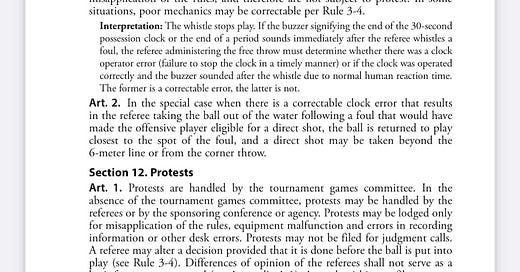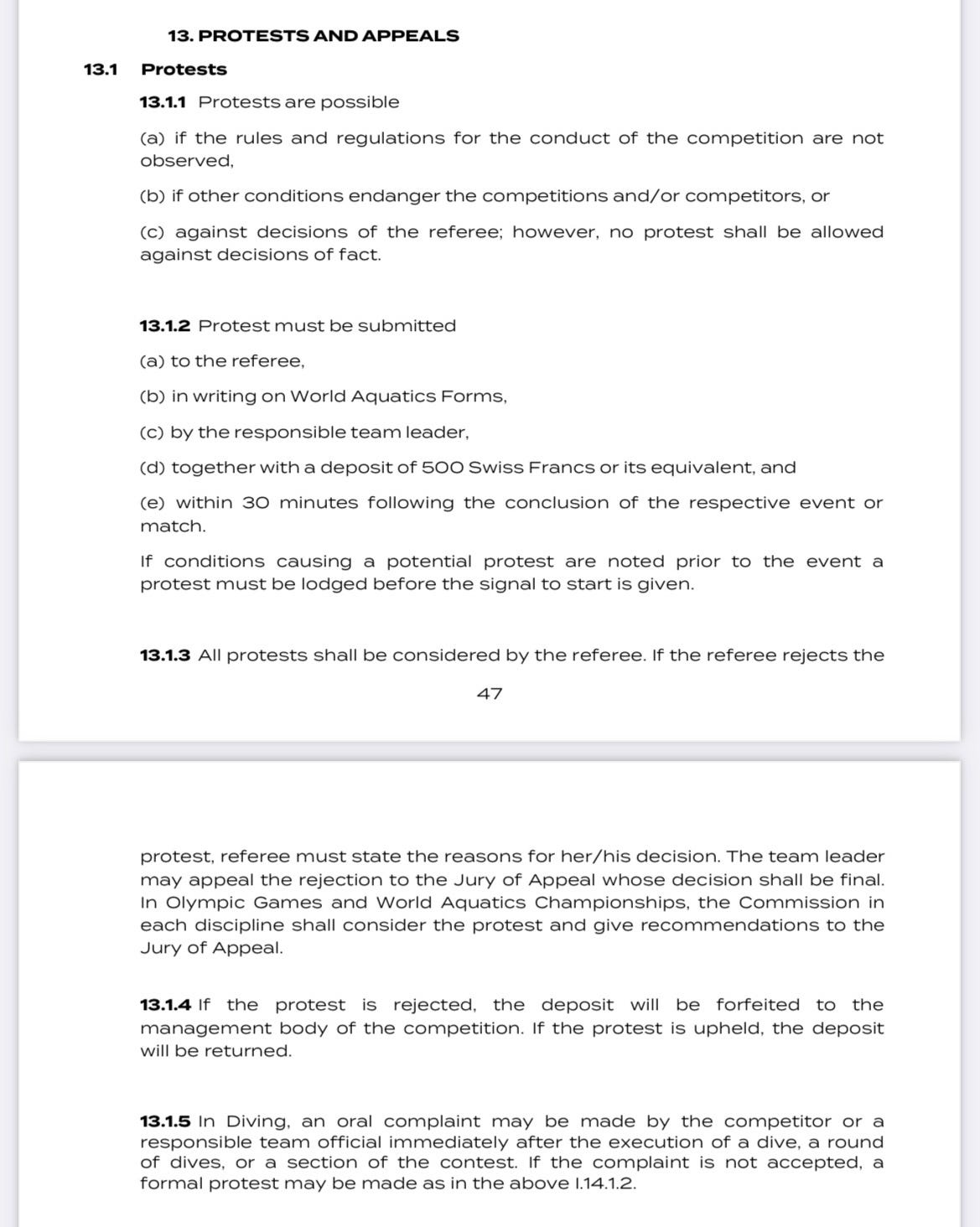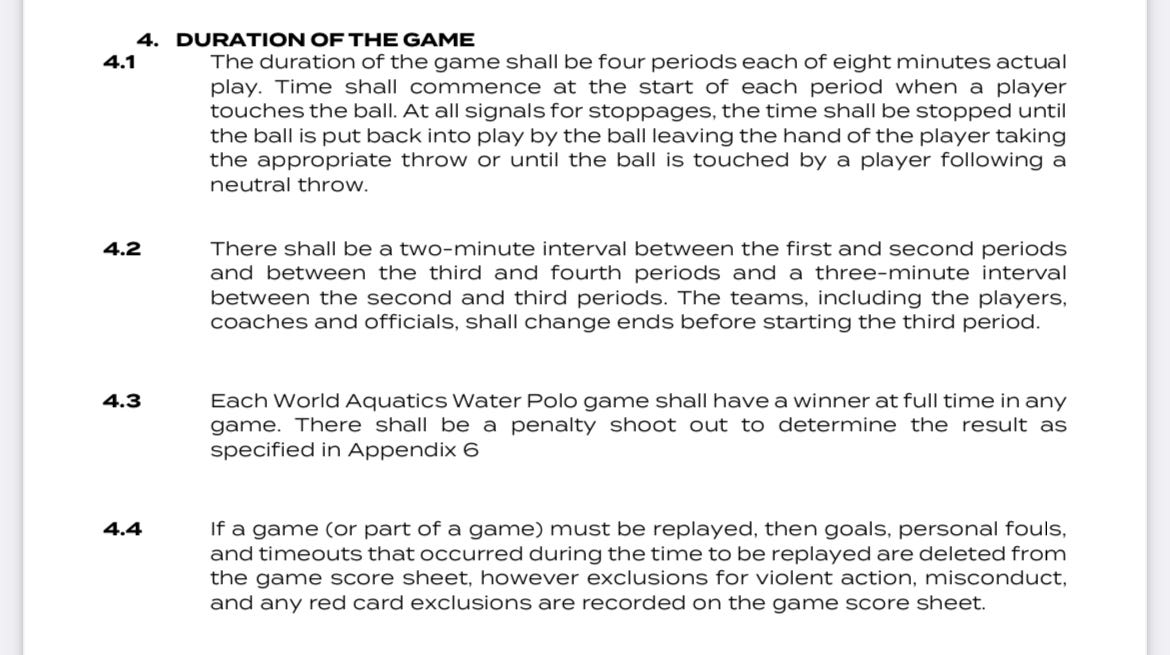I will be honest, I didn't actually have any intention of writing anymore about the events of the World Cup or the bronze medal game specifically. However, I am bugged; there are too many factors to what occurred and how it is being represented that I felt compelled to spend some more time with it.
My Interpretation of Events
First, an explanation of what I believe occurred based on my live attendance and reviewing the original game footage. The entire sequence where Woodhead draws first an exclusion and then a penalty starts about 1:17:50 in that footage. At 1:19:02 as Hooper is waiting to take the penalty there is a player in the exclusion area for Hungary and Mescall comments that they are "trying to get everyone lined up." At 1:19:09 a second Hungarian player enters the exclusion area and the first exits to the bench. The referees then have the player in the exclusion area re-enter, so there are 6 field players in and no one excluded for Hungary. Hooper takes the penalty at 1:19:35 with no Hungarian players in the box. This is the point of the technical error on the part of the officials; therefore, when play was restarted the point of the restart was prior to the penalty being taken so that it was taken appropriately (with an excluded player in the exclusion area).
After the penalty is blocked, the referees attempt to restart play with the sides even and both the American players in the water and Coach Udovicic try to question this and are waved off by the officials. This sequence resulted in Coach Udovicic receiving a yellow card. Interestingly, I don’t believe the US team was asking for the penalty to be retaken at this time, but instead to be allowed to complete the 7 seconds they felt were left on the original exclusion. Had the officials listened, I wonder if the actual error–not having a player in the exclusion area–would have even been noticed.
As we all know, the game continued to a penalty shootout which Hungary won, but the US put the money down and successfully protested the game so that it had to be replayed from that point. The US went on to score the penalty and one more deciding goal while holding the Hungarians to none to take the bronze medal in a strange fashion.
How the Protest is Being Discussed
I said in my previous post reflecting on the World Cup games that any team would have protested the game just like the United States did, and I stand by that. As much as I’ve heard this being represented as “oh the US didn’t like the outcome so they just complained and got their way,” that to me is a drastic misunderstanding of the rules of this sport and sports in general. Likewise, if you want to be upset that the game was replayed then direct that feeling at the officials for the game. They are the ones who made the error, they are the ones who wouldn’t listen to a coach imploring them in the moment to see the mistake, and they are the reason the game had to be replayed not the US team or staff.
In looking at the way sports officials can make mistakes, you differentiate between errors in judgment (sometimes called factual errors) and technical errors. This is an instance of the latter. The rules were misapplied and the manner in which it was handled is the procedure for a misapplication of the rules or technical error in many sports. For instance, An NBA game between the Hawks and Heat in 2008 had to replay the final :51 seconds of a game several weeks later due to a technical error by a desk official. Being upset about the replay taking place or suggesting that it isn't the manner in which it should be handled doesn’t really have any traction with me.
So while I agree with many that this is not something we should want to become commonplace, the fault is with the officials and the game was decided in accordance with the current rules…or was it?
Looking at the Rules
In the commentary to the game, John Abdou and Greg Mescall repeatedly mentioned the term “correctable error.” This is not surprising as they are American commentators and most familiar with the NCAA and NFHS rules for water polo which contain the following section (taken from the 22-23 NCAA rulebook):
So, at least in the two major rulesets in the United States a clear definition of correctable errors is given as well as what can and cannot be protested; furthermore, a direct procedure for how and when they should be brought to the attention of the official and how they are adjudicated is outlined. Importantly, it is made clear that “[i]f the protest is upheld…the game will be replayed from the point of the event protested.”
World Aquatics recently released a new, revised, consolidated rulebook for all its member sports as part of the rebranding from FINA. The intention was to have the rules for all aquatics sports in one place and to trim unnecessary, wordy or redundant rules. Since these are the rules the game was being played under, I decided to look at what the rule book says about this issue. Below is the section of the common rule book dealing with protests and appeals:
The only other mention of protests or replaying all or part of a game is here:
So, rule 13 tells us that protests are allowed, what can be protested and how to protest. With this we can say that the US protested on the basis of 13.1.1(c), the decision of the referees, but not on a “decision of fact.” WP rule 4.4 then lets us know a small detail about how the scoresheet is handled in the event of a replay.
Conclusion
At this point, you may be thinking to yourself, “but these are basically saying the same thing aren't they polosopher?” Ostensibly, they are. Both allow for protests due to a referee decision that is not a factual decision and outline procedures for how to do so. The important distinction in my determination is twofold: The differences in language used by both and the instructions or indications for the procedure after a successful protest.
The first issue is fairly straightforward: By having a section called “Correctable Errors” that clearly defines a correctable error as well as specifically using the term “misapplication of the rules,” the American rule set is more clear, specific and understandable about what types of table and (importantly for us) referee errors can result in a protest. In removing or not including these terms and definitions any longer for the sake of streamlining a joint rulebook as World Aquatics has done, the rules are made less clear for the only team sport the organization represents. It is not beneficial to the sport of water polo or the spectators following the game partly because it removes language specific to water polo that can be essential to understanding why a situation has occurred.
Notably in the American rules, protests must be filed immediately not after the game as in the WA rules. Were these the rules in effect during the World Cup, the game would have either stopped immediately when Coach Udovicic received the yellow card (assuming he took that opportunity to protest the game) or the game would have ended with the penalties because the US would have lost their window to protest. Since the WA rules require all protests to take place at the end of the game, the replay of the game taking place hours later was inevitable. Further, the American version of the rules is explicit about what to do in the event of a successful protest as mentioned above, but the WA rules have no such instructions. The only way to know that the result is the same as the American rules is to imply it based on past knowledge and a snippet of the rules relating to the duration of the game. Well I am aware that there are referee instructions given at events and training that may cover this issue or other special circumstances, these are not available to the general public (at least without great effort).
We all agree that the bronze medal game at the World Cup was bizarre due to the protest and replay. I’ve made it clear here that I do not think directing any animosity at the US team or staff for the protest has any place. I will, however, criticize both USAWP and WA for how the situation was and has been communicated after the fact. World Aquatics especially has an imperative to be open and educational about what occurred to eliminate any mutterings of impropriety. What is really damning to me though is that anyone who would want to go to the rules of the sport to understand what happened and why the game was replayed the way it was would not find much that is useful. It is my belief that we should endeavor at all times to make the rules as clear and direct as possible and the new World Aquatics combined rules do not do so. They removed the language that makes it possible to talk about errors like this and once again made the procedures something that is meant to be understood rather than explicit. Is this the biggest problem in the sport? Absolutely not. But if the goal is to grow the sport and make it more accessible to more audiences then clarity and ease of understanding should be at the forefront in how we write the rules.
As always, I appreciate you taking the time to read and would love to hear your thoughts on this or any other water polo topic. Until next time, keep thinking water polo!






